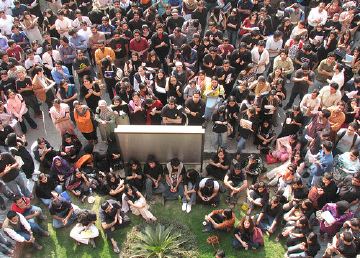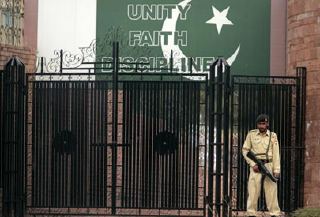Adil Najam
 The frustration and anger that one finds in the comments on the Emergency imposed by Gen. Musharraf in Pakistan is mirrored everywhere. In every conversation one has with any Pakistani anywhere. I was in Pakistan till last weekend and this pent-up feeling of frustration was evident in every conversation even before the Emergency was imposed.
The frustration and anger that one finds in the comments on the Emergency imposed by Gen. Musharraf in Pakistan is mirrored everywhere. In every conversation one has with any Pakistani anywhere. I was in Pakistan till last weekend and this pent-up feeling of frustration was evident in every conversation even before the Emergency was imposed.
It is, of course, a complex feeling emanating from the complex dynamics of our complex politics. At its very core, however, is the burning desire to be able to “do something” about what is happening made all the intense by a sense of helplessness about exactly what it is that we as citizens might, in fact, be able to do that might make a difference.
Since Saturday every conversation I have had with Pakistanis ends in exactly this question. What can we do? I have an in-box full of emails asking me to sign a petition, attend a meeting, say this or that to the media if I speak to them, join a protest, pass on a message, do this or that on ATP, join a conference call to plan a strategy, send out notes to my contacts, and so much more. There have been call after call from friends and acquaintance many of whom not even Pakistanis who just want to talk and share the intensity of their disgust at how the events are unfolding.
Of course, at the basest level doing anything – anything at all – has a cathartic effect and makes one feel that at least we did not do nothing. But the desire to do something is more intense. The desire not to just be a spectator to history. The desire to have contributed something, somehow. As one watches the heroic struggle of the lawyers, and now the students, to stand up and speak out – despite the brutality they are met with – makes this desire even more intense.
We each do what we can. We speak out to the media (I have had more than a dozen media interviews and comments already, we give talks (I have been giving multiple talks on this a day), we send out messages of support to those on the front lines in Pakistan to let them know that they are not alone, we sign petitions, and above all we hold hands in solidarity and vent our feelings where ever we can – on blogs, on phone calls to friends, in gatherings. All of this helps some, but one keeps wondering if it really makes a difference to the big picture?
Even if it is not, it is clearly worth doing. But can more be done? What? How? We would like to hear from our readers on that. Please let us know what is already happening as well as suggest what more could happen.
 Are there to many petitions going around; so many that they might lose their efficacy? Are some of us crossing the line between that which is anti-Musharraf and that which is anti-Pakistan? Even if they mean the same thing, strategically would a message that is pro-constitution, pro-democracy, pro-Pakistani resistance be better than one that is anti-individual? How can one best support those lawyers and students and others who are on the front-line of action, especially those who are not physically there? What, if any, are the dangers of focusing our attention too much of external actors rather than those in Pakistan itself? How does one explain to the media and policy-makers abroad that the events we are seeing is not the failure of a nation (the Pakistani people) these are the failure of a person and a particular government? (I personally have been saying to friends and to the media that I remain bullish on Pakistan and bearish on Musharraf).
Are there to many petitions going around; so many that they might lose their efficacy? Are some of us crossing the line between that which is anti-Musharraf and that which is anti-Pakistan? Even if they mean the same thing, strategically would a message that is pro-constitution, pro-democracy, pro-Pakistani resistance be better than one that is anti-individual? How can one best support those lawyers and students and others who are on the front-line of action, especially those who are not physically there? What, if any, are the dangers of focusing our attention too much of external actors rather than those in Pakistan itself? How does one explain to the media and policy-makers abroad that the events we are seeing is not the failure of a nation (the Pakistani people) these are the failure of a person and a particular government? (I personally have been saying to friends and to the media that I remain bullish on Pakistan and bearish on Musharraf).
These and many others are the questions that boil in ones head. There must be other questions too. Share these with us, but more importantly point us towards answers. Share with our readers what you are doing. How others can help. What should be done.
Note to commentors: My own views on the subject have been pretty clear and I feel no compulsion to either defend them or amend them. While I consider thsi emergency an anti-Pakistan and anti-Pakistani act, I do not doubt the patriotism or integrity of those who disagree. Pakistaniat is based on the premise that there can be, have to be, multiple views and they all must be respected, even when we disagree with them. Those of us who resent the emergency because it has tried to silence certain voices cannot then silence or disempower those who disagree with our views.
I say all this because over the last few days we have had to moderate out too many comments. More, in fact, from people we might agree with than those who we do not. One realizes that the moment is tense and passions are flared, but we stand committed to implementing our comment policy as best as we can. We have moderated, and will continue to do so, not because of content but because of infringements of our comment policy. We are, and will remain, especially careful about inappropriate language, personal attacks, inflammatory and disrespectful tactics, uncivil and slanderous language, and irrelevant diatribes. Please help us in not moderating your comment out by resisting these things. (And, please stop sending us notes about why you can misbehave because someone else did; we try to catch these things as best as we can and even if we miss them sometimes that does not give others a liscence to misbehavior). We remain committed to having a civil discourse and no matter whether we agree with you or not, no matter if you are an old friend or anew acquaintance, we will do our best to maintain that civility. If and when we feel that we are unable to do so, we are more likely to just close down the blog then to give in to people’s tantrums and badtameezi.



















































Adil, you have summed up beautifully my mood in, being bullish on Pakistan and bearish on musharraf.
It is an emotional time for many. Those of us in the west who are now constantly peppered with questions from well meaning people at the water coolers or in public should keep that sentiment in mind. Pakistan will survive this. We will survive Musharraf, we will survive the terrorists, we will survive the manipulative opportunists. So please stay positive about Pakistan. None of us commenting here made this mess, we shouldn’t be throwing mus on each other either. If anything this website provides us a forum to study all views and formulate ours. Crisis like the current should allow us to test our views.
It’s really sickening to see opportunists and self serving people like Benazir Bhutto, Asif Zardari and their cronies highjack the legitimate struggle of the lawyers and judiciary. Their smiling photos are splashed all over western media, which is portraying this as a struggle between Musharraf and PPP and the ‘wronged’ woman former Prime Minister who now seeks justice and freedom for the people of Pakistan. For some reason all of this seems orchestrated by the interfering powers to present Benazir as a popular peoples leader and a saviour of Pakistan. If this plan becomes successful all roads will lead towards an inevitable disaster for our country. Danda jidhar chalana hai udher chalta nahi Musharraf say. The wrath of his government is again falling on the unarmed protestors as militants continue to capture territory in our Northern Areas, wild west style. May Allah help Pakistan.
A suggestion for those of you organizing protests in LUMS and other university campuses. Since your protests are being covered by US media, you might want to carry a placard with a picture of Thomas Jefferson or quotes from him. Musharraf and his minions are trying hard to convince US media that this martial law is targeted at anti-US segments of Pakistani society. Carrying such a placard/picture would shatter this false argument.
I think there is no one particular solution to the problem. But as Adil says we must promote plurality. Also nations reach consensus on sensitive issues in a long time and I think one aim of all this discussion is to create such consensuses. And I think barring a few, the common voice is against the emergency, which in itself is a great achievement, as was achieved in the case of the removal of the CJP Iftikhar Chaudhary. And since this consensus has been achieved it can rightly be said that change will come, sooner or later.
To